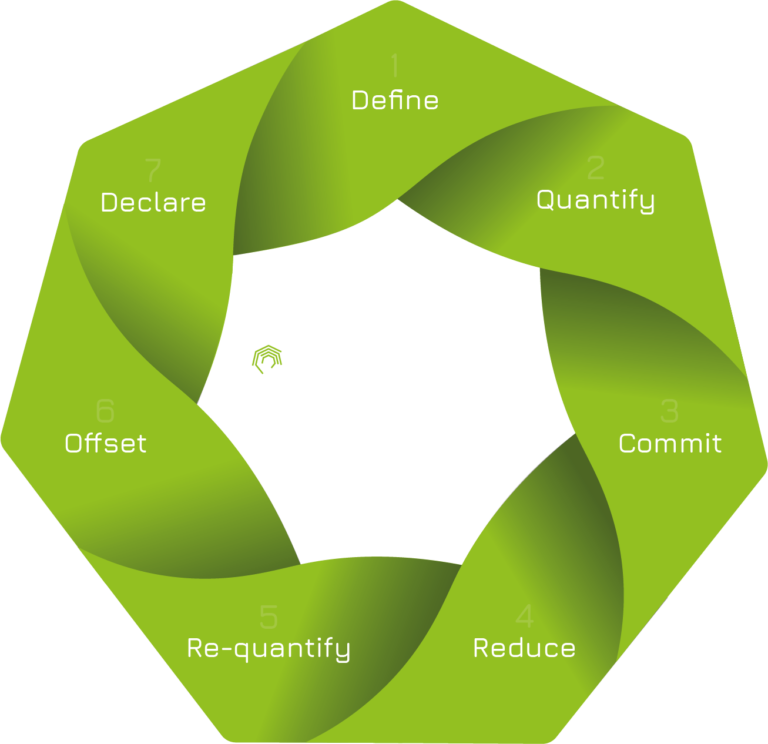With the increasing importance of sustainability and climate action in the business world, organisations worldwide are compelled to evaluate their carbon footprints to identify areas for improvement and demonstrate their commitment to reducing greenhouse gas (GHG) emissions. While direct emissions, or Scope 1 and 2 emissions, are commonly the primary focus, Scope 3 emissions – indirect emissions resulting from activities in an organisation’s value chain – also play a critical role in a comprehensive and effective sustainability strategy.
Scope 3 emissions encompass a broad range of sources, including purchased goods and services, transportation and distribution, business travel, employee commuting, waste generation, and end-of-life treatment of products. Since Scope 3 emissions usually account for a significant portion of an organisation’s overall carbon footprint, addressing them can substantially improve environmental performance and contribute to global climate goals. However, as Scope 3 emissions stem from complex supply chains and business relationships, executing reduction strategies can be challenging and may require a specialised approach.
Carbonology, with its extensive experience in carbon neutrality and ISO standards, assists organisations in navigating the complexities of Scope 3 emissions management. By partnering with Carbonology, businesses can gain valuable insights and support in quantifying, monitoring, and reducing their Scope 3 emissions, fostering sustainability, and driving tangible change in their industry.
In this article, we will delve deeper into Scope 3 emissions – what they are, why they are crucial for businesses to address, and how Carbonology can guide you in implementing effective reduction strategies to achieve a holistic sustainability approach and create a positive impact on our planet.
Scope 3 Emissions: Unravelling the Challenges
While Scope 1 emissions result from a company’s direct operations, and Scope 2 emissions arise from purchased energy, Scope 3 emissions encompass various indirect emissions associated with a business’s value chain. They are often divided into upstream and downstream categories, further clarifying the origins of these emissions.
1. Upstream Scope 3 emissions: Upstream emissions relate to the production and delivery of goods and services procured by the company. These emissions may originate from suppliers, transportation providers, or other business operations responsible for the manufacture and delivery aspects of the value chain.
2. Downstream Scope 3 emissions: Downstream emissions refer to those incurred post-production, stemming from the use and disposal of a product and encompassing aspects such as product use, waste management, and end-of-life disposal processes.
The Role of Scope 3 Emissions in a Comprehensive Sustainability Strategy
Addressing Scope 3 emissions is a vital component of an organisation’s climate strategy for several reasons:
1. Quantifying the True Environmental Impact: Scope 3 emissions typically constitute a significant proportion of an organisation’s carbon footprint. By measuring and analysing these emissions, businesses can ensure the accurate tracking of their overall environmental impact.
2. Identifying Emission Hotspots: Accounting for Scope 3 emissions can reveal emission hotspots within the value chain, enabling organisations to strategise and prioritise emission reduction initiatives.
3. Supply Chain Sustainability: Addressing Scope 3 emissions encourages businesses to collaborate with suppliers and other stakeholders to co-develop sustainable solutions, fostering better supply chain management and promoting industry-wide sustainability.
4. Enhanced Reputation and Stakeholder Confidence: A demonstrated commitment to reducing both direct and indirect emissions strengthens a company’s reputation as a sustainability leader, boosting consumer trust and stakeholder confidence.
Carbonology’s Expertise in Scope 3 Emissions Management
Carbonology offers tailored solutions to support your organisation’s Scope 3 emissions management, providing expertise in the following areas:
1. Quantification and Reporting: Accurate quantification of Scope 3 emissions is essential to develop and implement targeted reduction strategies. Carbonology assists businesses in measuring their Scope 3 emissions, as per the GHG Protocol Corporate Value Chain (Scope 3) Accounting and Reporting Standard. This standard provides a comprehensive framework for calculating and reporting these emissions across numerous categories.
2. Emissions Reduction Planning: After identifying the emission hotspots within your organisation’s value chain, Carbonology can help you design and execute emissions reduction plans, collaborating with relevant stakeholders and leveraging industry best practices to drive tangible change.
3. Monitoring and Performance Assessment: Carbonology offers ongoing support to businesses in tracking the progress of their implemented Scope 3 emissions reduction strategies. This continuous engagement ensures that your organisation is consistently working towards its sustainability objectives and adapting its approach when needed.
4. Communications and Reporting: Effective communication of your organisation’s Scope 3 emissions management efforts is essential to maintain transparency and demonstrate sustainability progress to stakeholders. Carbonology can support you in crafting comprehensive emissions reports and navigating climate-related disclosure frameworks, such as the Task Force on Climate-related Financial Disclosures (TCFD) recommendations.
Integrating Scope 3 Emissions Reduction with Carbon Neutrality Goals
Organisations are increasingly targeting carbon neutrality as part of their climate action efforts, balancing their emissions by investing in carbon offset projects or adopting renewable energy sources. Addressing Scope 3 emissions plays a critical role in achieving such goals by ensuring the comprehensive management and reduction of both direct and indirect emissions.
Carbonology can guide businesses in aligning their Scope 3 emissions reduction strategies with broader carbon neutrality goals, ensuring a cohesive and effective approach to climate action.
Building a Greener Future with Carbonology
Achieving a comprehensive understanding of your organisation’s Scope 3 emissions is a vital step towards a more sustainable future. By partnering with Carbonology and leveraging their expertise in carbon management, your business can effectively quantify, reduce, and report its Scope 3 emissions with confidence.
Act now and seize the opportunity to foster a climate-conscious culture within your organisation by addressing Scope 3 emissions. With Carbonology as your partner, you can transform your value chain into a powerful tool for change, driving industry-wide progress towards a greener, more responsible future.
Don’t wait to enhance your company’s sustainability performance. Connect with Carbonology and explore how our services can support your organisation in managing Scope 3 emissions and fulfilling its commitment to climate action.

